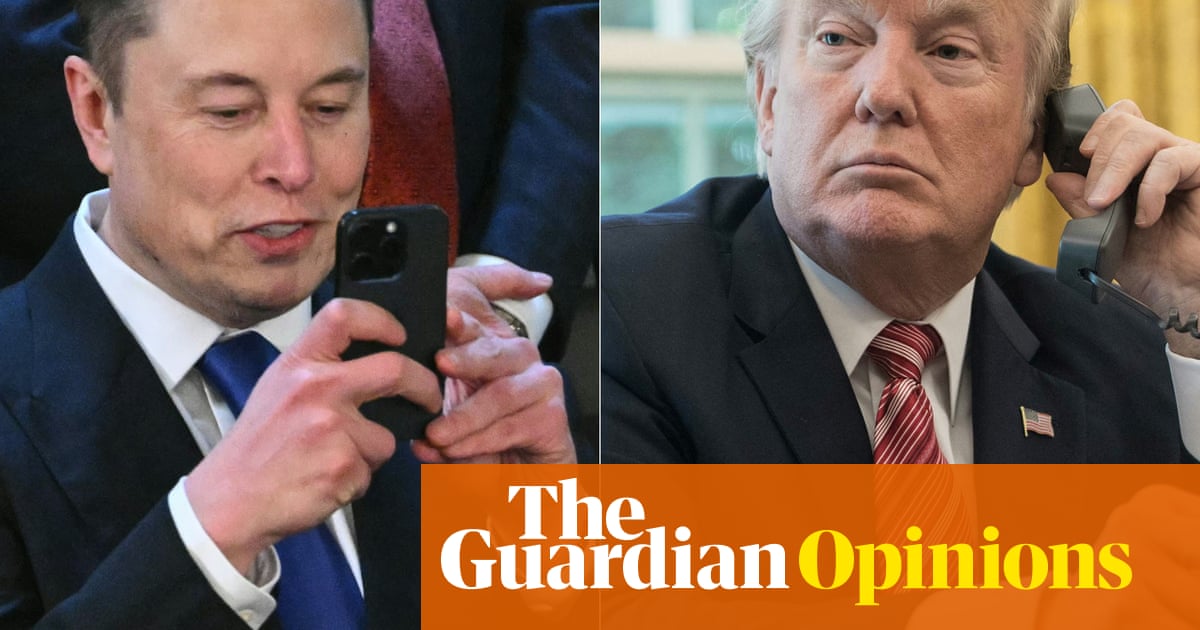As the world watchesDonald TrumpandElon Muskpublicly fight over the sweeping legislation moving through Congress, we should not let the drama distract us. There is something deeper afoot: unprecedented wealth concentration – and the unbridled power that comes with such wealth – has distorted our democracy and is driving societal and economic tensions.
Musk, the world’s richest man, wields power no one person should have. He has used this power to elect candidates that will enact policies to protect his interests and he even bought his way into government. While at the helm of Doge, Musk dramatically reshaped the government in ways that benefit him – for instance, slashing regulatory agenciesinvestigating his businesses– and hollowed out spending to make way for tax cuts that would enrich him.
Musk is just one example of the ways in which unchecked concentration of wealth is eroding US democracy and economic equality. Just 800 families in the US are collectively worth almost$7tn– a record-breaking figure that exceeds the wealth of thebottom half of the US combined.While most of us earn money through labor, these ultra-wealthy individuals let the tax code and their investments do the work for them. Under the current federal income tax system,over halfof the real-world income available to the top 0.1% of wealth-holders (those with $62m or more) goestotally untaxed. As a result, billionaires like Elon Musk and Jeff Bezos have gotten away with payingzero dollars in federal income taxes in some years,even when their real sources of income were soaring.
On the other side, millions of hard-working Americans are struggling to make ends meet. Their anxiety is growing as tariffs threaten to explode already rising costs.
A broken tax code means unchecked wealth-hoarding. The numbers are staggering:$1tn of wealth was created for the 19 richest US households just last year(to put that number into perspective, that is more than the output of the entire Swiss economy). That was the largest one-year increase in wealth ever recorded. I have studied this rapidly ballooning wealth concentration, and like my colleagues who focus on democracy and governance, I am alarmed by the increasingly aggressive power wielded by a small number of ultra-wealthy individuals.
The good news is, hope is not lost. We can break up this dangerous concentration of wealth by taxing billionaires. There is growing public support for doing just this, even among Republican voters. A recent Morning Consult poll found that70% of Republicansbelieved “the wealthiest Americans should pay higher taxes”, up from 62% six years ago.
With many of Trump’s 2017 tax cuts for the wealthy set to expire this year, legislators have an opportunity to reset the balance driving dangerous wealth-hoarding. Rather than considering raising taxes on middle-class Americans or even households earning above $400,000, they must focus on the immense concentration of wealth among the very top 0.1% of Americans. This would not only break up concentrated wealth, but also generate substantial revenue.
One mechanism for achieving this goal is a wealth tax on the ultra-wealthy. The Tax Policy Center recently released an analysis of a new policy called the Five & Dime tax. This proposal would impose a 5% tax on household wealth exceeding $50m and a 10% tax on household wealth over $250m. The Five & Dime tax would raise $6.8tn over 10 years, slow the rate at which the US mints new billionaires, and reduce the billionaires’ share of total US wealth from 4% to 3%.
While breaking up dangerous wealth concentration is reason enough to tax billionaires, this revenue could be invested in programs that support working families and in turn boost the economy. Lawmakers could opt for high-return public investments like debt-free college, helping working families afford childcare, expanding affordable housing, rebuilding crumbling infrastructure, and strengthening climate initiatives.
Ultimately, taxes on the ultra-rich could transform American society for the better andgrow the economyby discouraging unproductive financial behaviors and promoting fair competition – leading to a more dynamic and efficient system.
Critics will inevitably claim such a tax would stifle economic growth or prove too challenging for the IRS to implement. But in our highly educated nation, the idea that growth and innovation comes from just a handful of ultra-wealthy individuals does not withstand scrutiny. And while there are challenges for administering any bold proposal, America has always been up for a challenge.
After witnessing the consequences of billionaire governance firsthand under this administration, Americans understand what’s at stake. We are seeing how unchecked, astronomical wealth has corrupted American democracy and stifled the economy. It’s not too late to act. Now it’s time for lawmakers who care about the country’s future to embrace solutions that empower everyone, not just the few at the top.
Gabriel Zucman is professor of economics at the University of California Berkeley and the Paris School of Economics
